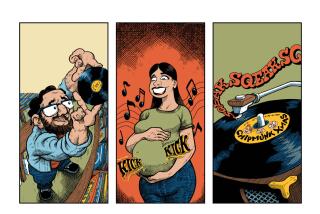Time to Erase Tape Format From Pop Repertory? : Music industry: Tower Records begins phasing out cassettes by cutting inventory and reducing orders in its 87 stores. Other retailers dispute idea that the popular format is becoming obsolete.
Just five years after American pop fans said goodby to vinyl albums, one of the nation’s showcase retailers says it is time to pull the plug on another contemporary pop trademark: cassettes.
In a dramatic move, Tower Records, the first chain to usher in compact discs, has already begun slowly phasing out the tape format by cutting cassette inventory and reducing orders in its 87 stores.
“The cassette is on the verge of extinction,” said Stan Goman, senior vice president of the Sacramento-based Tower chain, which expects to be completely out of the cassette business within two years. “I may be a bit myopic, but the way I see it, prerecorded tapes are fast approaching the fate of vinyl.”
Other retailers, however, expressed surprise this week at Tower’s decision--and disputed the idea that cassettes are obsolete.
“We consider the cassette tape to be an extremely viable product and anticipate it to be around for at least another five years,” said Arnie Bernstein, president of the music division of Musicland, the nation’s largest record retail chain.
“Tapes don’t have the same problems as LPs when competing with compact discs. Cassettes offer consumers an economically priced portable medium unlike any other on the market.”
Mike Murray, vice president and general manager of the music division of the Ft. Lauderdale-based, 520-outlet Blockbuster chain, agreed.
“We have no intention of quitting the cassette business and would be more than happy to accommodate any customer Tower turns away.”
Industry debate over the future of cassettes intensified in recent weeks as 1993 figures showed that cassette sales accounted for less than 46% of the recording industry’s $9-billion business, down from 61% five years ago.
Last year’s figure was an all-time cassette low since the tapes became popular in the late ‘70s--down 8% from 1992, according to SoundScan, the research firm that tabulates computerized data for the music business. However, figures show, tape remains the configuration of choice for more than half of the nation’s rap and country fans and continues to dominate sales in mass merchant stores such as K mart and Target.
Tower’s retreat from cassettes--which represented only 20% of the chain’s ’93 sales total--is based on the stores’ unique position in the retail market, says Goman.
The firm derives more revenue from catalogue sales than its competitors and specializes in classical music--a genre in which all but the Top 50 selling albums is no longer available on cassette.
Goman says as tapes continue to lose ground to the compact disc, record companies will stop manufacturing cassette versions of catalogue albums in pop, rock and other genres.
He and other industry analysts attribute the shift in consumer allegiance to the better sound, greater durability and ease of programming of CDs.
The vinyl album disappeared, retailers say, because it could not compete with the superior home audio experience delivered by the compact disc. Indeed, more than 42% of American households have switched from the turntable to the CD player since the CD’s advent in 1984.
But most consumers who purchase albums on cassette listen to them in cars or on portable players--not at home, recording industry surveys suggest.
Although sales for CD car and portable players are on the rise, few industry analysts expect them to overtake rival cassette players before the turn of the century. So far, music fans have failed to respond to alternative high-tech formats such as Sony’s mini disc machine and Philips’ digital compact cassette (DCC) player.
“Portability and price are the two critical issues here,” said Jay Berman, chief executive officer of the Recording Industry Assn. of America, the Washington trade organization whose member companies manufacture about 95% of the recordings sold in the United States.
“People have grown accustomed to the relatively inexpensive price of Walkmans and until something comes along to compete with that, I just don’t see the cassette disappearing.”
But Goman feels other factors will also work against the cassette in coming months, notably the recent threat of price-slashing from discount houses such as Best Buy and Circuit City, which sell Top 40 compact discs below cost for $10. Such competition is forcing record chains to reduce superstar CDs to $11.98--only $1 more than the suggested list price of top-line cassettes.
“The only way the record companies can save the cassette is to drop the price, but what do you think the chances are that they’re going to do that?” said Goman, who intends to eventually replace cassettes at Tower with book, video and CD-ROM products.
“The only reason that tape is still a factor in the U.S. is that the industry has yet to come up with an economically feasible way to make compact discs portable. Mark my words: When that day arrives, you can put a fork in it, mister, because it’ll be done.”
More to Read
The biggest entertainment stories
Get our big stories about Hollywood, film, television, music, arts, culture and more right in your inbox as soon as they publish.
You may occasionally receive promotional content from the Los Angeles Times.










